News
Check out the latest news about NAA and special announcements pertinent to the field of afterschool.
Children categories

STEM Gems (1)
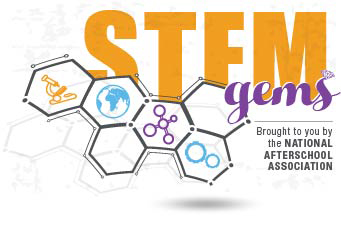
STEM Gems are short discovery-based experiences. They involve little or no materials and may be easily implemented by educators who are not STEM specialists. Each STEM Gem is designed to engage young people in active experiential learning. The activities begin by setting up connections to prior knowledge, then a hands on activity provides new concepts and the opportunity to design experiments to answer any questions the kids discover. Finally, a connection to a different scenario for the concept is provided to help cement and evaluate the learning.
STEM Gems are experiences designed to be used with kids of all ages. Younger children should be focused on one idea or concept and should perform the activity as a collective group with prompts and directions from the teacher. With older youth, the teacher should act as a facilitator. The older youth should be set up to work independently in small teams and encouraged to ask questions and try out their own experiments to answer them. Each team should report back on their findings, so a consensus around the concept is reached.
Each STEM Gem is presented in an easy to follow lesson plan:
Big Ideas and Science Talk
Central concepts and key words to give the adult the science background for the experience.
Engage
Open ended questions to stimulate discussion and generate connections to prior knowledge.
What You Will Need
A list of the materials.
Before You Begin
The preparation needed for the activity.
Explore and Experiment
The directions for the experience designed using open ended questions that focus the children on discovering answers.
Make the Connection and Extend and Evaluate
Connections to other scenarios that use the same concepts and related question(s) or additional activity to evaluate knowledge.
STEM Gems are available to members only. Login to access STEM Gems.
View items...
Webinar: Effective Budgeting for Your Afterschool Program
Thursday, September 29, 1:00 EST | Presented by FMA
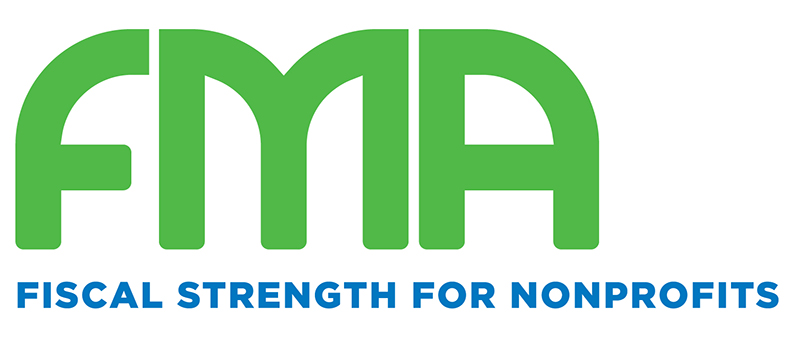
Effective budgeting is one of the key ways to ensure that your afterschool program is using your resources in the most strategic way and that your organization is financially sustainable into the future.
This webinar will:
- Describe a budgeting process that enlists input from across your organization
- Highlight tools that can be used by program staff and senior leaders to develop budgets in a (relatively) painless way.
- Demonstrate tools from StrongNonprofits.org, a web site developed by FMA in partnership with the Wallace Foundation to bring free resources for more effective financial management to after-school providers and the broader nonprofit sector.
This webinar is for Executive-level members only.
Registration is now closed.
Save
Social and Emotional Learning
During the summer of 2015, The National Afterschool Association (NAA) conducted an online survey to learn more about program practices and practitioners' understanding, implementation and needs around social and emotional learning. In partnership with the American Institutes for Research (AIR), NAA analyzed the results of the survey and developed three calls to action for field leaders, funders, policymakers and other to better support the development of SEL competencies. Click here for the findings and recommendations.
Resource Print Center

Want to order multiple copies of NAA resources for your staff or for a professional development or another event? Looking to stock your resource library? Ever tried to print several copies on your small HP OfficeJet printer and run out of ink?
Our members have spoken and in response to community requests for a print solution we have partnered with mimeo.com to provide the NAA Resource Print Center – your one-stop shop for bulk printing of NAA Resources. Online ordering is easy – just click here or on the button below to browse or search resources, enter the quantity needed, add the documents to your cart, and then finish checkout. Resources will be shipped to you within a couple of days depending on selected shipping speed.
VISIT THE RESOURCE PRINT CENTER
Is there an NAA resource that you'd like to see posted in the Resource Print Center? If so, please let us know by emailing info@naaweb.org.
NAA17 Ads
Thank you for your help in spreading the word about NAA's Annual Convention!
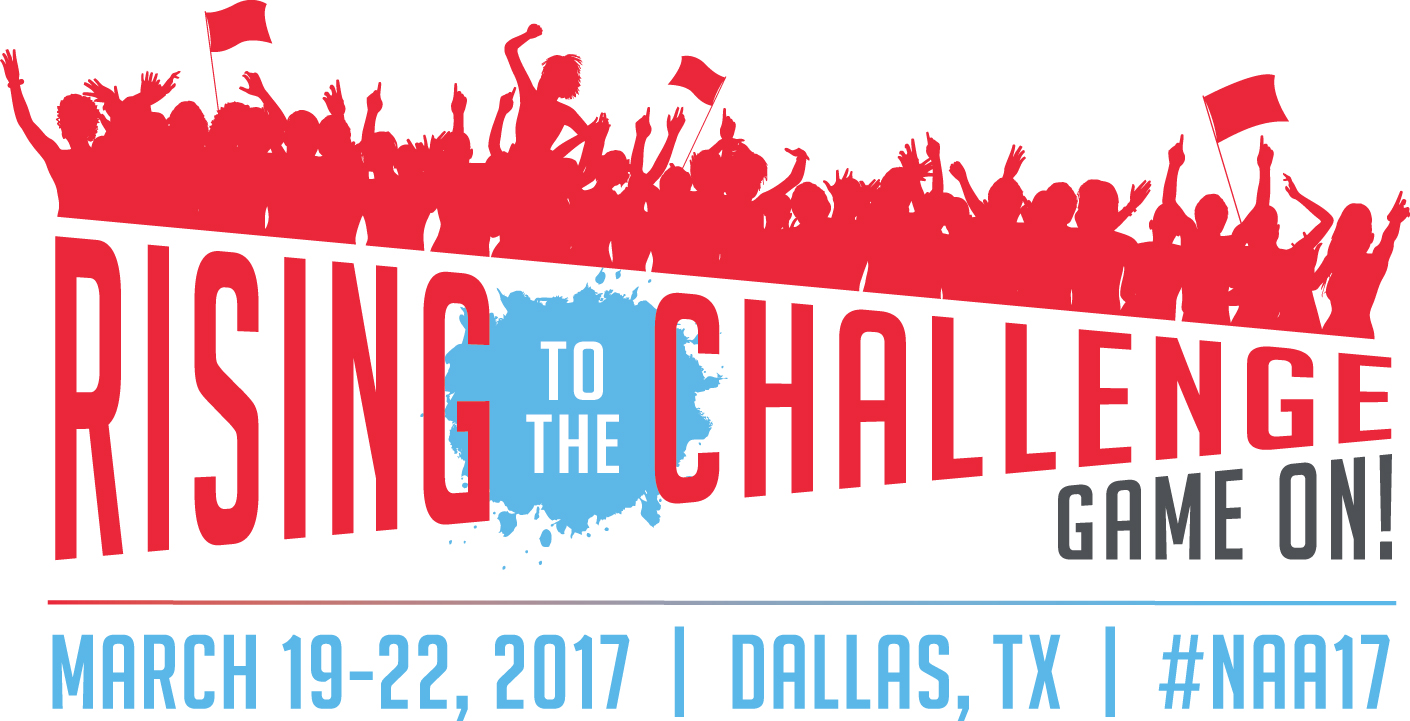
We've created a variety of ads in different sizes. Please click below to download. Should you require additional assistance, please email jill@serendipity-media.com.
Guidelines
Proposal Guidelines
To be considered for review, all proposals must be fully completed and submitted, by October 17, 2016 including:
- Title (50-character limit): designed to interest participants. It may be easier to write your title after writing your description.
- Description (750-character limit): brief accurate description that communicates the content you'll deliver, why it's important to our participants, and what they can expect to gain from attending. This description is read from a participant point-of-view during the workshop selection process to decide if it's a good fit for NAA17. Make it compelling!
- Identify format, learning strand and content level for your presentation. Select the best fit for your content. Learn more about formats, strands and content levels (see below for more info).
- Presenter Contact Info: phone number, email address, organization, title for all presenters (including co-presenters and panelists).
- All aspects of the proposal should be written in complete sentences. This is your opportunity to make an impression, please be as professional as possible.
- If selected, you must confirm presentation by December 16 and register for the conference by January 6. Please note, all presenters are required to register for Convention. Lead presenters (only one per session/poster) receive discounted rate of $350 if registered by January 30, 2017. After that, rates will increase. Co-presenters, panelists and other presenters are required to register at the full Convention rate, based on the date of their registration. Learn more about rates and registration deadlines here.
Session Formats
NAA17 offers three presentation formats:
- Workshop: 75-minute sessions intended for hands-on trainings, discussions, lectures, panel presentations, or active sessions that engage physical activities. At least 15-minutes of audience Q&A is required.
- Express: Quick, 30-minute sessions that share ideas participants can use right away. It could be a website, project, or special event you hosted. No Q&A time required.
- Posters: Pre-printed posters that are displayed in the Learning Expo on Tuesday of Convention. Poster presenters will stand with their posters during lunch on Tuesday from 12:30pm-1:45pm to answer questions and engage with participants about their work. Poster presenters must hang their posters on assigned poster board in the Learning Expo the morning of Tuesday, March 21st and remove posters the same day by 2:00pm.
Learning Strands
All presentations must fall within one learning strand (that best fits your content). Strands align with NAA's Core Knowledge and Competencies for Afterschool and Youth Professionals.
- Learn more about NAA Core Knowledge and Competencies.
- Use our Core Knowledge and Competencies Self-Assessment Tools to help you self-evaluate and develop a personal Professional Development Action Plan.
We offer four strands with suggested sub-topics, though each strand is not limited to the sub-topics included.
1. Developing High Quality and Innovative Programs (NAA Core Knowledge Competencies 1, 2, 3). Subtopics include (but are not limited to):
- Curricula and Activity Ideas
- Developing Learning Environments
- Supporting the Whole Child
- Project Based Learning
- Social Emotional Learning (SEL) Programming
- STEM (Science, Technology, Engineering, and Math)
- Literacy
2. Youth Engagement (NAA Core Knowledge Competencies 4, 5, 6). Subtopics include (but are not limited to):
- Youth Voice and Choice
- Youth Leadership
- Youth Planning and Reflection
- Creating Community and Group Experiences
- Interactions
- Cooperative Learning
- Positive Guidance strategies
- Bullying Prevention
- Cultural Competence
- Inclusion
3. Healthy Eating, Physical Activity (HEPA), Community and Family Engagement (NAA Core Knowledge Competencies 7, 8). Subtopics include (but are not limited to):
- NAA HEPA Standards
- Healthy Eating Curricula, Activity Ideas, and Resources
- Physical Activity Curricula, Activity Ideas, and Resources
- Snack and Meals Resources
- Healthy Communities
- Family/Parent Engagement
- Developing Partnerships
- Community Engagement
4. Program and Professional Development (NAA Core Knowledge Competencies 9, 10). Subtopics include (but are not limited to):
- Continuous Program Improvement
- Funding and Sustainability
- Program Evaluation
- Core Competencies
- Human Resources
- Risk Management
- Staff Supervision
- Coaching
- Aligning with the School Day
- Youth Recruitment Strategies
- Program Marketing
- Self-care (work-life balance, time management, managing stress)
- Emotional Intelligence for adults
- Leadership development
- Training Skills (becoming a trainer)/Train the Trainer
- Workplace Culture
Content Level
All presentations must identify the content level to align with participant knowledge and training needed to fully participate in the session. Aligned to NAA's Core Knowledge Competencies, we have three levels to choose from:
Content Level (select one):
- Developing (NAA's Core Knowledge Competency Level 2) – Participants possess the knowledge and skills expected of someone with some experience in the field. Includes knowledge and skills that might be commensurate with a Youth Development Credential, a certificate in child/ youth development, or equivalent training/education or related work experience.
- Proficient (NAA's Core Knowledge Competency Level 3) – Participants are practitioners who can apply knowledge and information that meets requirements of Level 2 plus knowledge and skills that might be commensurate with an associate's degree in child/adolescent development or related fields (e.g., Social Work, Recreation, Special Education, Education) or related work experience.
- Advanced (NAA's Core Knowledge Competency Level 4) – Participants are seasoned practitioners who can apply knowledge and information in increasingly nuanced ways. Meets requirements of Levels 1, 2, and 3 plus the knowledge and skills that might be commensurate with a bachelor's degree in child/adolescent development or related fields or related work experience.
Questions?
Contact Presentation Managers Erin Leonard and Jill Poppe at Presenters@naaweb.org.
We look forward to reading your proposal!
Back-to-School Buying Guide
Summer is a popular time for back-to-school planning. From professional development and curriculum planning to supply purchasing and equipment upgrades, there's a lot for afterschool professionals to consider.
That's why we reached out to our Advocate Member Partners and asked them to submit one of their favorite offerings for Afterschool programs. We hope it proves helpful in making 2016-2017 your best school year ever!
Summer Buying Guide Advocate Member Submission Form
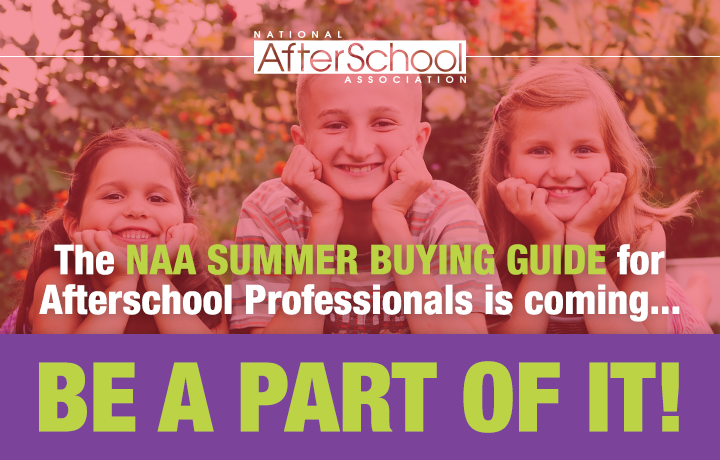
Thank you for your interest in contributing to NAA's Summer Buying Guide 2016! Please fill out the form below to enter your submission. In addition, if you have an image to accompany your product or offer, please upload it at the bottom of the form (300 DPI.)
Submissions for NAA's Summer Buying Guide 2016 are now closed.
Publications
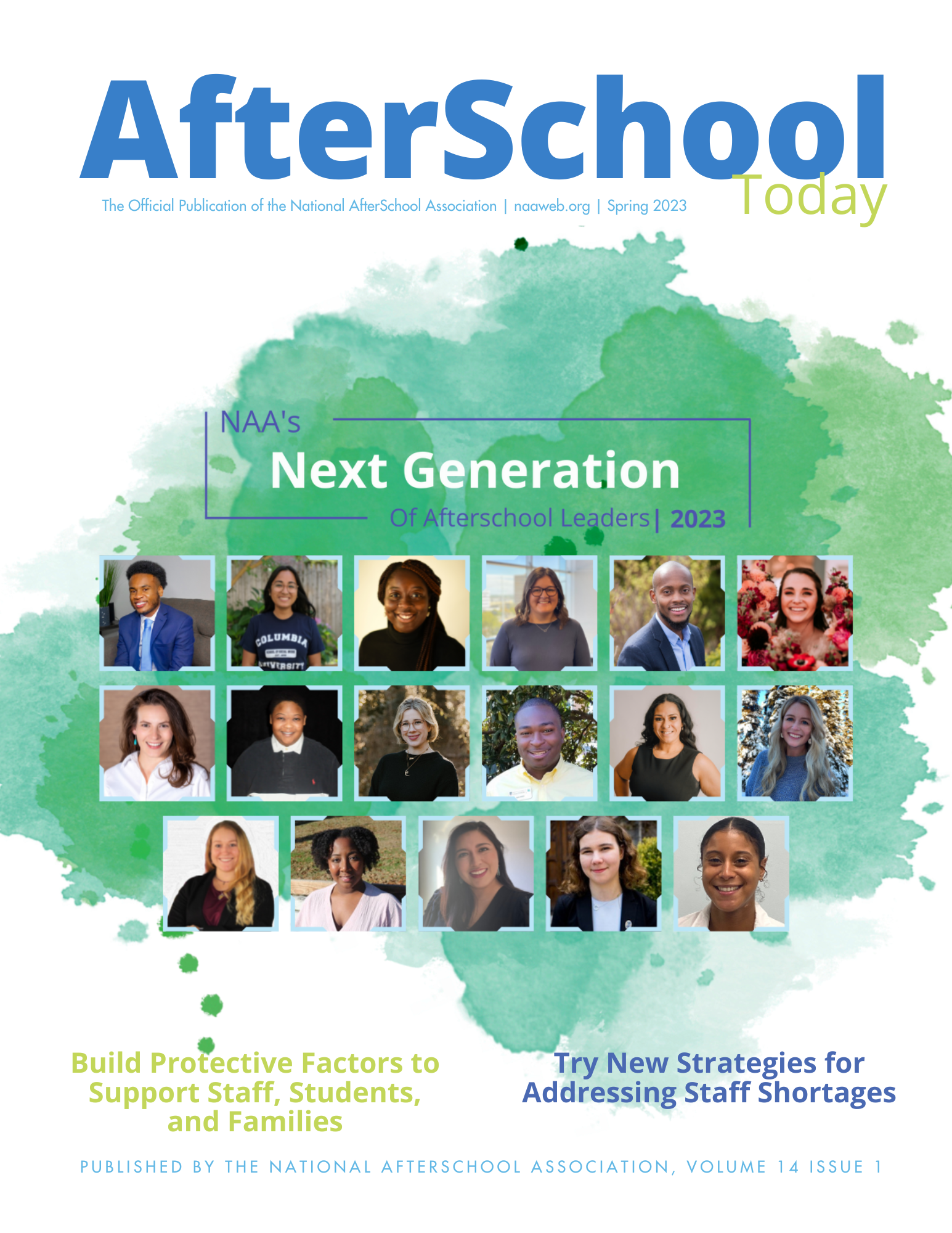 |
AfterSchool Today AfterSchool Today Digital Magazine is the official publication of NAA. Published bi-annually, it's dedicated to supporting members by providing quality content covering a wide variety of topics relevant to the field. Click here to read the current issue. |
eBook Submissions
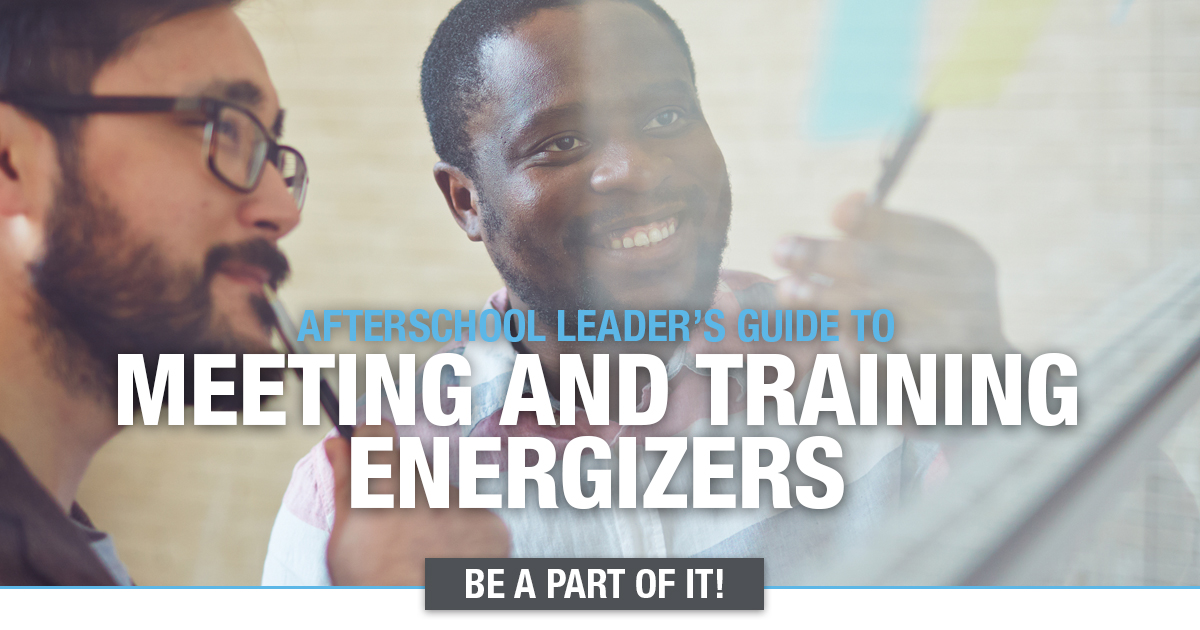
Submissions are now closed.
Brain breaks also known as energizers are short movement activities that educators typically use with young people to help recharge their minds and bodies after periods of sitting, but energizers aren't just for kids. When leaders integrate movement activities into meetings or trainings, they are modeling the healthy practices we want to encourage in afterschool programs and the profession AND participant concentration, creativity, overall health increases.
Do you have a favorite meeting or training energizer you’d like to share with the NAA Community?
If so, please submit your ideas below and you may see them included in our next eBook, the Afterschool Leaders Guide to Meeting and Training Energizers. In addition, if you have any images that display or help explain the game, please upload up to three photos at the bottom of the form (300 DPI.)
Afterschool Professionals Appreciation Week
Afterschool Professionals Appreciation Week
April 24-28, 2023
Afterschool Professionals Appreciation Week, the last full week of April each year, is a time to recognize, appreciate and advocate for those who work with young people during out-of-school hours. The week is marked by celebrations and public relations efforts encouraging appreciation and support for all the afterschool professionals who make a profound difference in the lives of young people.
Contact Us
General Inquiries
Email info@naaweb.org
Press/Media
Contact marcom@naaweb.org
National AfterSchool Association • 2961A Hunter Mill Road, #626 • Oakton, VA 22124 • info@naaweb.org
